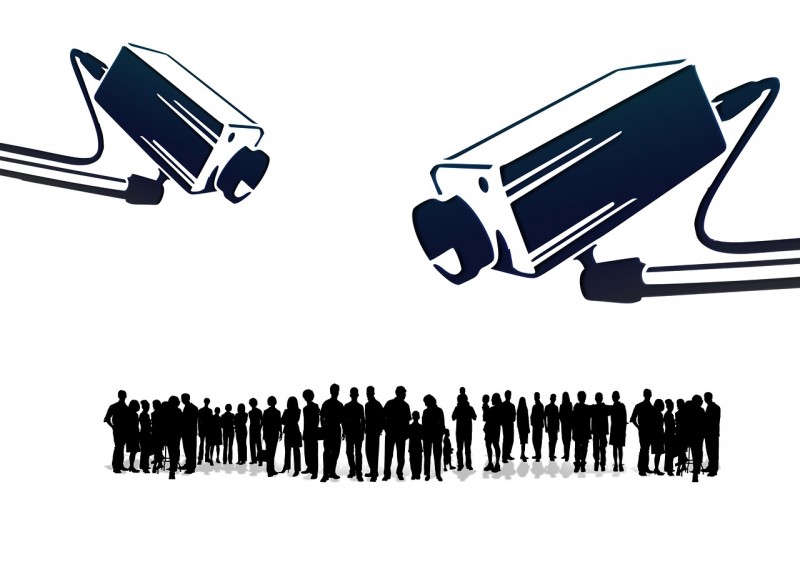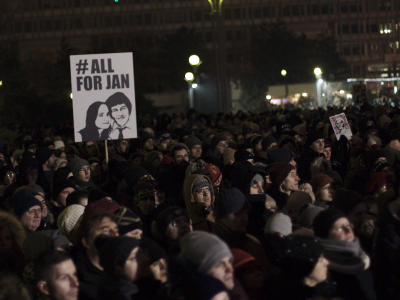
Human silhouettes camera monitoring. Image by Geralt via Pixabay. Licensed to public domain.
Global Voices Advocacy's Netizen Report offers an international snapshot of challenges, victories, and emerging trends in Internet rights around the world.
It has been a year since the EU Court of Justice found the EU Data Retention Directive to be “invalid” due in part to its infringement on user privacy. While stories of mass surveillance continue to dominate headlines in France, Germany and the UK, some European countries actually have sought to build stronger protections for user privacy. Last week, mass surveillance was officially ruled “unconstitutional” by the Constitutional Court of the Slovak Republic in a case brought by a coalition of parliament members working in cooperation with the European Information Society Institute, a local think tank. The decision will dismantle key elements of Slovakia’s 2011 Electronic Communications Act which required mass metadata collection and storage by telcos.
While a few European countries are taking leaps ahead in this category, the United States is taking only baby steps towards curbing mass surveillance.
New legislation before the US Congress may begin to curb US government mass surveillance capabilities, but could raise new challenges for telecommunications companies. Revised versions of the PATRIOT Act, one of three regulations under which the NSA’s mass surveillance programs are run, has preliminary support in the House of Representatives and an identical bill appears to be gaining traction in the Senate.
The bills would prohibit bulk collection of data by the government, a critical step in limiting government overreach into personal communications. User data would then be accessible to government agencies only with approval of the Foreign Intelligence Surveillance Court, an entity that since the Snowden revelations has gained a reputation for rubber stamping (i.e. automatically approving) nearly all data requests it receives. It is unclear what this will mean for telcos, who could be required to store and provide necessary security for that data instead. While this arrangement might better protect user data from government surveillance, it could leave users more vulnerable outside security threats.
Commenting on the amendments, Electronic Frontier Foundation activists Rainey Reitman and Mark Jaycox write: “The bill is far from ideal. But it does shift the status quo towards more privacy and, if passed, will be the first time since 1978 that the NSA has had its activities scaled back by Congress.”
As if to illustrate the still-pressing need to reign in mass surveillance programs, the US Office of the Director of National Intelligence reported that in the year 2014, one Section 702 order — which allows targeting of persons outside of the United States — was issued. Unfortunately, this is not at sweet as it sounds: the order affected the accounts of an estimated 92,707 people.
Iraqi media freedom advocate killed in Baghdad
Iraqi journalist Ammar Al Shahbander was killed in a car bomb explosion in Baghdad carried out by ISIS. Al Shahbander worked to defend free speech in Iraq as the Chief of Mission in Iraq for the Institute for War and Peace Reporting. Netizens throughout Iraq paid tribute to him, mourning his death on the eve of World Press Freedom Day.
Message apps blocked in Burundi
In the midst of protests surrounding upcoming presidential elections, the government of Burundi blocked WhatsApp and Viber, despite fewer than 2 percent of the country’s residents having access to the Internet. The move is the latest in a trend of increasingly restrictive measures used to quell dissent in Burundi – phone lines to private radio stations have also been cut, and the government passed a law in 2013 requiring journalists to become accredited and reveal their confidential sources under certain circumstances.
Hong Kongers call for stronger privacy protections
Hong Kong civic groups are calling for accountability in surveillance practices, following suspected widespread monitoring of mobile and Internet-based messaging apps during the Occupy Central movement. Civic groups including Hong Kong’s InMedia have called upon the government to ensure all forms of interpersonal communication are covered under Hong Kong’s surveillance law. They are also asking that the law ensure that police not surveil protest organizers, leaders of civic groups, or political dissidents on the grounds of public security.
“Great Cannon” blast on Facebook login service
According to The Verge, China’s Great Firewall has been used to attack the Facebook Login service by redirect users to a third-party web page by inserting code, a capability the Citizen Lab has labeled “the Great Cannon”. As this attack was performed through the Chinese national telecom infrastructure, only users located in China who were not using a VPN were affected. Similar tactics were previously used for a denial-of-service attack on GitHub and GreatFire.org in March.
Whether you’re in the water or on the street, watch out for stingrays
US law enforcement agencies have been secretly using Stingrays, which allow them to pull network data from mobile phones, for several years now. Thanks to a series of public records requests by various news and advocacy organizations, we now have a sense of the scope and scale of Stingray use among police organizations across the country. The practice is finally receiving pushback from regulators, according to a new report by the Wall Street Journal: the US Justice Department is undergoing a review of the practice and appears likely to change its stance on where and when stingrays can be deployed – and how much the public can know about their activities.
Blogging is personal
Last week we commemorated the anniversary of the arrest of the Zone 9 bloggers with an update on their current situation. But just as importantly, we hope to keep their stories alive, telling of their courage, their personal quirks, their names and their voices. In a mix of poetry and prose, Nigerian author and poet Nwachukwu Egbunike writes, “we cannot trample upon the humanity of others without devaluing our own.”
Bloggers face a complex and highly personal set of considerations in deciding whether to be anonymous online, say Global Voices Advocacy Director Ellery Biddle and Media Legal Defence Initiative Legal Director Nani Jansen. There is no definitive “right” answer, they argue — for some, anonymity can provide freedom to speak one’s mind. In other cases, including that of Ethiopia’s Zone 9 bloggers, legal bans on encryption introduce new risks when activists seek to protect their privacy. According to one member of the Advox community, “[One must] reflect on self-censorship, ethics, personal safety, and personal limits…one thing is technical security, another is your mental and emotional stability.” We want to open up the discussion to the broader community. Share your thoughts on anonymity in the comments section, tweet @advox, or send us a message.
New Research
Subscribe to the Netizen Report by email
Renata Avila, Ellery Roberts Biddle, Hae-in Lim, Bojan Perkov and Sarah Myers West contributed to this report.



